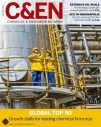ACS News Service Weekly PressPac: July 31, 2013
ACS News Service Weekly PressPac: July 31, 2013
- Science Inquiries: Michael Woods, Editor, 202-872-6293
- General Inquiries: Michael Bernstein, 202-872-6042
News Items in This Edition
Insect-inspired super rubber moves toward practical uses in medicine
The remarkable, rubber-like protein that enables dragonflies, grasshoppers and other insects to flap their wings, jump and chirp has major potential uses in medicine, scientists conclude in an article in the journal ACS Macro Letters. It evaluates the latest advances toward using a protein called resilin in nanosprings, biorubbers...

Progress in using ethanol to make key raw material now produced from oil
Ethanol from corn and other plants could become the sustainable, raw material for a huge variety of products, from plastic packaging to detergents to synthetic rubber, that are currently petroleum-based. This was the conclusion of an article published in the ACS journal Industrial & Engineering Chemistry Research...

Sediment trapped behind dams makes them ‘hot spots’ for greenhouse gas emissions
With the “green” reputation of large hydroelectric dams already in question, scientists are reporting that millions of smaller dams on rivers around the world make an important contribution to the greenhouse gases linked to global climate change. Their study, showing that more methane than previously believed bubbles out of the water...

Toward broad-spectrum antiviral drugs for common cold and other infections
Scientists are reporting progress in the search for the first broad-spectrum drugs to combat human rhinoviruses (HRVs), which cause humanity’s most common infectious diseases. Their study on these potential drugs for infections that include the common cold appears in the journal ACS Medicinal Chemistry Letters...

Chemical company giants stall with global economy
The world's 50 largest chemical companies — with combined 2012 sales of almost $1 trillion and products that touch the lives of people everywhere — are the topic of the cover story in the current edition of Chemical & Engineering News. C&EN is the weekly newsmagazine of the American Chemical Society, the world’s largest scientific society...

Journalists’ Resources
About the Weekly PressPac
The ACS Weekly PressPac consists of summaries of research published in the American Chemical Society’s more than 40 peer-reviewed journals and its weekly newsmagazine, Chemical & Engineering News. ACS journals publish more than 35,000 articles annually. Although not traditional press releases, PressPac content can be used to prepare news stories and also can be an excellent resource for features and background.
Press releases, briefings, and more from ACS’ 245th National Meeting
www.eurekalert.org/acsmeet.php
http://www.ustream.tv/channel/acslive
C&EN Video Spotlight: Stirring (Small) Things Up
Mixing tiny droplets of liquid can pose a big challenge to scientists. Now, thanks to a team in Singapore, researchers can reach for the world's smallest magnetic stir bars when they want to mix super-small solutions. Made from nanoparticles, these stir bars are so tiny that hundreds of millions of them can be suspended in a single drop of liquid. Watch as they make a glowing liquid whirl in a single droplet. Read the story and watch the video.
Must-Read from C&EN: The World's Longest Ongoing Scientific Experiment
Check out the famous “Pitch Drop Experiment” highlighted in C&EN’s popular Newscripts page. For the PDF, contact newsroom@acs.org.
Toolkits on Global Challenges/Research Funding
Journalists covering some of the great global challenges of the 21st century and federal funding of research and development (R&D) can find videos and scores of other resources in websites that the American Chemical Society has prepared on those topics.
The toolkits address the science of global climate science, finding sustainable sources of energy, the quest for a sustainable supply of fresh water and federal R&D funding.
An additional toolkit on sustainability in the global food supply will be available later in 2013.
C&EN Launches the Organic SCENE
The Organic SCENE, C&EN's latest news channel, offers a one-stop shop for coverage of a specific topic. It provides an up-to-the-minute stream of news about organic chemistry, including coverage of synthesis, reaction mechanisms, catalysis, medicinal chemistry, natural products and organic polymers. Check out the Organic SCENE’s home page, subscribe to its RSS feed or sign up for the weekly email newsletter highlighting the week’s top stories. Also, be sure to visit the other SCENEs on analytical chemistry, biology, environmental science, materials and nanotechnology.
ACS Pressroom Blog
The ACS Office of Public Affairs' pressroom blog highlights research from ACS’ more than 40 peer-reviewed journals and National Meetings.
Bytesize Science Blog
Educators and kids, put on your thinking caps: The American Chemical Society has a blog for Bytesize Science, a science podcast for kids of all ages.
ACS Satellite Pressroom: Daily news blasts on Twitter
The satellite press room has become one of the most popular science news sites on Twitter. To get our news blasts and updates, create a free account at https://twitter.com/signup. Then visit http://twitter.com/ACSpressroom and click the ‘join’ button beneath the press room logo.
C&EN on Twitter
Follow @cenmag at http://twitter.com/cenmag for the latest news in chemistry and dispatches from C&EN's blog, CENtral Science, at http://centralscience.org.
ACS Press Releases
Press releases on a variety of chemistry-related topics.
ACS Videos
The American Chemical Society encourages news organizations, museums, educational organizations, and other web sites to embed links to these videos.
Spellbound: How Kids Became Scientists
The road to a Nobel Prize began for one scientist in elementary school when his father placed a sign on his bedroom door proclaiming him to be a “doctor.” This is just one of the many experiences that helped launch the careers of scientists from diverse backgrounds who are featured in a new ACS video series called Spellbound: How Kids Became Scientists.
Prized Science video series
Prized Science: How the Science Behind ACS Awards Impacts Your Life video series is new for 2012! The first episode features the research of Dr. Robert Langer, winner of the 2012 ACS Priestley Medal. He is a professor at the Massachusetts Institute of Technology. The Priestley Medal is the highest honor of the ACS, and it recognizes Langer’s pioneering work making body tissues in the lab by growing cells on special pieces of plastic. Langer’s team has used the approach to make skin for burn patients, for instance, with the goal of eventually making whole organs for transplantation. The second episode features Dr. Chad Mirkin, winner of the 2012 ACS Award for Creative Invention. His research has provided patients with faster diagnoses for influenza and other respiratory infections, and new tests that improve care for heart disease. More episodes will appear later in the year. The series is available at the Prized Science website and on DVD by email request.
The Periodic Table Table Featuring Theo Gray
Some people collect stamps. Wolfram Research co-founder and author Theo Gray collects elements. Step into his office, and you'll see a silicon disc engraved with Homer Simpson, a jar of mercury, uranium shells and hundreds of other chemical artifacts. But his real DIY masterpiece is the world's first "periodic table table.” Within this masterfully constructed table-top lay samples of nearly every element known to man, minus the super-radioactive ones.
Healing the voice: Synthetic vocal cords
Synthetic vocal cords may someday heal the voices of singers like Julie Andrews — whose legendary voice was permanently damaged in a 1997 operation. Filmed in the lab of 2012 ACS Priestley Medalist and MIT Institute Professor Robert Langer, our latest video explains how artificial polymer vocal cords may help repair damaged vocal tissue.
Other videos:
Related Links
Inside Science News Service
Visit for thoroughly enjoyable multimedia coverage of the science behind the news — a valuable resource for journalists and news media organizations everywhere.
ACS Podcasts
Bytesize Science, a podcast for young listeners
Bytesize Science is a science podcast for kids of all ages that entertains and educates, with new high-definition video podcasts and some episodes in Spanish. Subscribe to Bytesize Science using iTunes. No iTunes? No problem. Listen to the latest episodes of Bytesize Science in your web browser.

Global Challenges/Chemistry Solutions
This special series of ACS podcasts focuses on some of the 21st Century’s most daunting challenges, and how chemists and other scientists are finding solutions. Subscribe at iTunes or listen and access other resources at the ACS web site www.acs.org/GlobalChallenges.

Science Elements: ACS science news podcast
Science Elements is a podcast of PressPac contents that makes cutting-edge scientific discoveries from ACS journals available to a broader public audience. Subscribe to Science Elements using iTunes. Listen to the latest episodes of Science Elements in your web browser. Science Elements is on Facebook, — check out the latest updates and information.

SciFinder® Podcasts
Interested in healthful plant phytochemicals, nanotechnology, or green chemistry? Check out the SciFinder series of podcasts, which explore a vast array of current interest topics and new discoveries in the 21st century. The SciFinder podcasts are available in English, Chinese, Japanese, and Portuguese.
And Don’t Miss…
General Chemistry Glossary
Simple definitions and explanations of chemistry terms.
Note to Journalists and Other Viewers

This is the latest American Chemical Society (ACS) Office of Public Affairs Weekly PressPac with news from ACS’ more than 40 peer-reviewed journals and Chemical & Engineering News.
This information is intended for your personal use in news gathering and reporting and should not be distributed to others. Anyone using advance ACS Office of Public Affairs Weekly PressPac information for stocks or securities dealing may be guilty of insider trading under the federal Securities Exchange Act of 1934.
Please cite the individual journal, or the American Chemical Society, as the source of this information.
The American Chemical Society is a non-profit organization chartered by the U.S. Congress. With more than 163,000 members, ACS is the world’s largest scientific society and a global leader in providing access to chemistry-related research through its multiple databases, peer-reviewed journals and scientific conferences. Its main offices are in Washington, D.C., and Columbus, Ohio.

